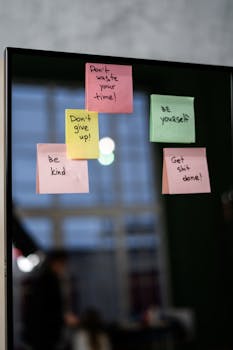What is persistent reminders?

What is persistent reminders?
In today’s fast-paced world, staying organized can feel like an uphill battle. This is where persistent reminders come into play. They’re designed to help you remember important tasks and events without the constant need to juggle mental checklists. By integrating these reminders into your daily life, you can enhance productivity and manage time more effectively.
Understanding Persistent Reminders
To grasp the concept of persistent reminders, it’s important to break down what they are and how they function in our lives.
Definition of Persistent Reminders
Persistent reminders are consistent cues or notifications that help individuals remember tasks or events over time. They act as gentle nudges, urging you to take action or recall something important. Unlike regular reminders that may disappear after a set time, persistent reminders stay in your view until you acknowledge them. This feature is particularly helpful for people who juggle multiple responsibilities, as it reduces the risk of forgetting crucial tasks.
Examples of Persistent Reminders
You may have encountered various forms of persistent reminders in your daily routine. Here are some common examples:
- Calendar Alerts: Digital calendars often send notifications that persist until you dismiss them. Whether it’s a meeting or a birthday, these reminders help you stay on track.
- Task Management Apps: Apps like Todoist or Trello allow users to set persistent reminders for tasks. For instance, you can have a task “Submit report” that keeps reminding you until it’s marked complete.
- Physical Reminders: Sticky notes on your computer or fridge serve as visual reminders. With a simple glance, they can jog your memory about important tasks or appointments.
Benefits of Using Persistent Reminders
Employing persistent reminders in your life can have numerous positive impacts, especially when it comes to productivity and personal well-being.
Enhanced Productivity
Do you often find yourself distracted or forgetful? Persistent reminders can significantly improve your focus. By providing consistent notifications, they help you prioritize tasks and manage your time effectively. Imagine having a digital nudge every hour to check off tasks on your to-do list. This method not only keeps you on track but also reduces procrastination.
Reduction of Stress and Anxiety
Having persistent reminders in place can alleviate the fear of forgetting important tasks. This leads to improved mental health; when you know you won’t forget something crucial, you can focus more on the tasks at hand. For example, a reminder about an upcoming deadline can prevent last-minute panic, allowing for a more relaxed work environment.
Implementing Persistent Reminders in Daily Life
To truly benefit from persistent reminders, it’s essential to integrate them into your daily routine effectively.
Utilizing Technology for Reminders
Today’s technology offers various tools and apps designed specifically for this purpose. Here are some popular ones:
- Google Calendar: You can set persistent reminders for events, ensuring they stay on screen until acknowledged. This is great for both personal and work-related tasks.
- Todoist: This task management app allows you to create tasks with persistent reminders, keeping your responsibilities in front of you until they are marked done.
- Reminder Apps: Several apps are designed specifically for reminders, such as Due or Reminder. They continuously ping you until you take action.
Establishing a Reminder Routine
Creating a routine around your reminders can enhance their effectiveness. For example, set specific times each day to review your reminders. This could be in the morning before starting your day or in the evening to plan for tomorrow. By establishing this habit, you’ll ensure that persistent reminders are an integral part of your time management strategy.
Challenges and Solutions with Persistent Reminders
While persistent reminders offer many benefits, they also come with their own set of challenges.
Over-Reliance on Reminders
One potential downside of using persistent reminders is becoming too dependent on them. If you’re constantly bombarded with reminders, it can lead to a cluttered mind and potential burnout. To combat this, try to balance the use of reminders with personal accountability. For instance, instead of relying solely on digital notifications, jot down your tasks in a planner.
Customization of Reminders
Not all reminders work for everyone. The effectiveness of a reminder can depend greatly on how personalized it is. Take time to customize your reminders to fit your preferences. For example, you might prefer a visual reminder over an auditory one. Adjusting your notifications based on what resonates with you can improve their effectiveness.
Conclusion
Incorporating persistent reminders into your daily life can transform your productivity levels and enhance your time management skills. By understanding their importance and taking steps to implement them thoughtfully, you can enjoy a more organized and less stressful life. So why not start today? Embrace the power of reminders and see how they can work wonders for your productivity. With the right approach, you’ll not only keep track of your tasks but also foster a healthier work-life balance.